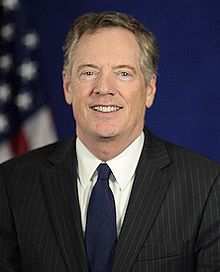
Robert Lighthizer
Modernizing NAFTA and supporting agricultural trade and U.S. jobs were at the top of the list of priorities for U.S. Sens. Pat Roberts (R-KS) and Rob Portman (R-OH) during a committee hearing with U.S. Trade Representative Robert Lighthizer on Wednesday.
Lighthizer, a former deputy U.S. trade representative who was confirmed as trade ambassador in May, appeared before the Senate Finance Committee to discuss President Donald Trump’s trade agenda and fiscal year 2018 budget proposal.
Roberts, the chairman of the Senate Agriculture, Nutrition and Forestry Committee, said it’s clear that the nation’s agricultural economy is experiencing difficulties and will not improve without a “determined effort on trade.”
“The work Ambassador Lighthizer has done in the past two months has made it clear he is the administration’s leader on trade,” Roberts said. “I want to thank him for spreading the message and educating his colleagues and international counterparts about the importance of agriculture trade.”
Roberts praised the Trump administration’s recent announcement that it had reached an agreement to end China’s ban on beef imports from the United States. China’s commitment to move toward a science-based system of approval for agricultural exports was another positive element of the 100-day action plan of the U.S.-China Comprehensive Economic Dialogue, Roberts noted.
Lighthizer, in giving an update on U.S.-China trade talks, said, “We have, I think, another few days in the 100-day period; there are a variety of other items on which there are negotiations. There’s a hope that we’ll get another harvest on some level before the 100 days are up. Then the question for the administration and Chinese government is what is the next step.”
Portman, meanwhile, said he supports updating NAFTA given it was negotiated 23 years ago. The labor standards in the NAFTA agreement do not represent what the United States now negotiates with countries as part of bilateral trade agreements. Advancements made in digital trade also should be reflected in a revamped NAFTA agreement, he said.
Portman also noted changing policies on currency negotiations in bilateral trade agreements over the last two years, and the country now has a principal trade negotiating objective that includes currency manipulation.
“I’m not suggesting that Canada and Mexico are manipulating their currency, but I am suggesting this is an opportunity for us to set a precedent for future trade agreements,” Portman said. “I’m excited about the opportunity to improve the agreement from our perspective.”
Mexico and Canada are important trading partners for Ohio, Portman said, noting that 50 percent of the state’s exports go to those two countries.



